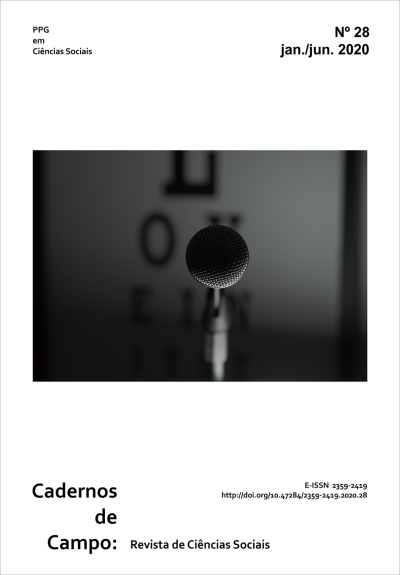“Eles querem quebrar a mesa”: terrorismo e diálogo
DOI:
https://doi.org/10.47284/2359-2419.2020.28.309323Palavras-chave:
Terrorismo, Violência, Racialidade, Outro racial,Resumo
Este artigo se propõe a discutir a figura do novo terrorista enquanto uma construção política e epistêmica que se fundamenta sobre a produção histórica do Outro racial e serve de veículo à sua manutenção. Partindo de alguns fundamentos característicos à abordagem teórica em torno do conceito de novo terrorismo, discuto como a apreensão epistêmica racializada de determinadas ações violentas, ao confina-las na categoria contemporânea de terrorismo, extirpa-as de sua inteligibilidade e impede a priori a consideração de seu caráter dialógico.
Downloads
Referências
BENJAMIN, Daniel; SIMON, Steven. The New Face of Terrorism. The New York Times, 04 jan., 2000. Disponível em: https://www.nytimes.com/2000/01/04/opinion/the-new-face-of-terrorism.html. Acesso em: 13/04/2019.
CRENSHAW, Martha. The debate over “new” vs. “old” terrorism. In: KARAWAN, Ibrahim; MCCORMACK, Wayne; REYNOLDS, Stephen (ed). Values and violence: intangible aspects of terrorism. Springer, 2008, pp. 117-136.
DORLIN, Elsa. What a body cad Do. Radical Philosophy, Autumn 2019. Disponível em: https://www.radicalphilosophy.com/article/what-a-body-can-do#fnref9. Acesso em: 02/03/2020.
FANON, Frantz. Os condenados da terra. Editora UFJF. Juiz de Fora, 2005.
FANON, Frantz; KHALFA, Jean & YOUNG, Robert J. C. (orgs.). Alienation and Freedom. Londres, Bloomsbury Academic, 2018.
GANOR, Boaz. Defining terrorism: is one man’s terrorist another man’s freedom fighter?. Police, Practice and Research, v. 3, n. 4, p. 287-304, 2002.
HABERMAS, Jünger; DERRIDA, Jacques; BORRADORI, Giovanna. Philosophy in a time of terror. Dialogues with Jünger Habermas and Jacques Derrida. The University of Chicago Press, Chicago/Londres, 2003.
JACKSON, Richard. The core commitments of critical terrorism studies. European Political Science, v. 8, n. 3, p. 1-8, 2007.
JACKSON, Richard. Unknown knowns: the subjugated knowledge of terrorism studies. Critical Studies on Terrorism, v. 5 (1), 2012, pp.11-29.
LOADENTHAL, Michael. Othering terrorism: a rethorical strategy of strategic labeling. Genocide Studies and Prevention: An International Journal, v. 13, n. 2, 2019.
MBEMBE, Achille. Crítica da razão negra. Editora Antígona, Lisboa, 2014.
MILLIKEN, Jennifer. The study of discourse in International Relations: a critique of research and methods. European Journal of International Relations, v.5, n.2, p. 225-254, 1999.
MISSE, Michel. Dizer a violência. Revista Katálysis, v.11, n.2, 2008, p.165-166.
MISSE, Michel. Violência e teoria social. Dilemas, v.9, n.1, 2015, p.45-63.
MOGHADAM, Valentine. Violence and terrorism: feminist observations on Islamist movements, State, and the international system. Comparative studies of South Asia, Africa and the Middle East, vol.21(1&2), 2001, pp.125-131.
MOITA, Luís. “Nine/eleven”: repercussões no pensamento europeu. In: MORAES, Rodrigo; NASSER, Reginaldo; SOUZA, André de Mello (orgs.). Do 11 de setembro de 2001 à Guerra ao Terror. Reflexões sobre o terrorismo no século XXI. Ipea, Brasília, 2014, pp. 107-127.
NASSER, Reginaldo. As falácias do conceito de “terrorismo religioso”. In: MORAES, Rodrigo; NASSER, Reginaldo; SOUZA, André de Mello (orgs.). Do 11 de setembro de 2001 à Guerra ao Terror. Reflexões sobre o terrorismo no século XXI. Ipea, Brasília, 2014, pp. 65-87.
RAMSAY, Gilbert. Why terrorism can, but should not be defined. Critical Studies on Terrorism, 8:2, 2014, pp. 211-128.
SILKE, Andrew; SCHMIDT-PETERSEN, Jennifer. The golden age? What the most 100 cited articles in terrorism studies tell us. Terrorism and Political Violence, p.1-21, 2015.
SILVA, Denise Ferreira da. Toward a Global Idea of Race. Minneapolis, University of Minnesota Press, 2007.
SILVA, Denise Ferreira da. Ninguém: direito, racialidade e violência. Meritum, v. 9, n. 1. Belo Horizonte, 2014.
SILVA, Denise Ferreira da. Fractal Thinking. aCCeSsions, n. 2, 2016. Disponível em: https://accessions.org/article2/fractal-thinking/. Acessado em 07/11/2018.
TUASTAD, Dag. Neo-orientalism and the new barbarism thesis: aspects of symbolic violence in the middle east conflict(s). Third World Quarterly, v. 24, n. 4, p. 591-599, 2003.
TURK, Austin T. Sociology of terrorism. Annual Review of Sociology, v. 30, p. 271-286, 2004.
WATTS, Michael. Revolutionary Islam. In: GREGORY, Derek; PRED, Allan (orgs.). Violent Geographies. Fear, terror and political violence. Routledge, Nova Iorque, 2008.
WIEVIORKA, Michel. From classical terrorism to ‘global’ terrorism. International Journal of Conflict and Violence. Vol. 1(2), 2007, pp. 92-104.
WIEVIORKA, Michel. An interview with Michel Wieviorka: violence, evil and good. [Entrevista a] KILBY, Jane. In: European Journal of Social Theory. Vol. 16(3), 2013, pp.377-390.
WIEVIORKA, Michel. Repressão e vigilância não bastam contra o terror. [Entrevista concedida a] GOMIDE, Raphael. Época, São Paulo, 2015. Disponível em: https://epoca.globo.com/tempo/noticia/2015/01/bmichel-wieviorkab-repressao-e-vigilancia-nao-bastam-contra-o-terror.html. Acessado em 13/04/2019.
WIEVIORKA, Michel; SAGEMAN, Marc. Terrorism, radicalisation and Islam: Michel Wieviorka in conversation with Marc Sageman. [Entrevista a] The Conversation. The Conversation, Paris. 19 de nov. de 2017. Disponível em:
https://theconversation.com/terrorism-radicalisation-and-islam-michel-wieviorka-in-conversation-with-marc-sageman-86651. Acesso em: 13/04/2019.









